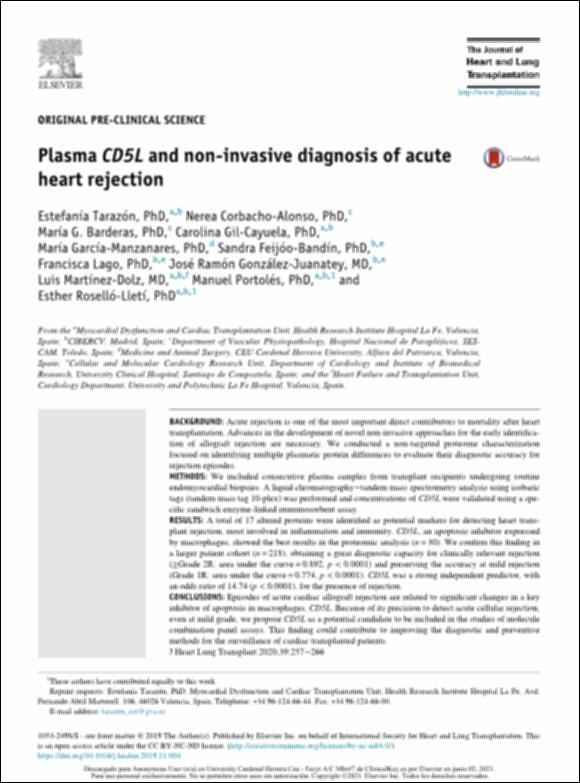Por favor, use este identificador para citar o enlazar este ítem:
http://hdl.handle.net/10637/12728Plasma CD5L and non-invasive diagnosis of acute heart rejection
| Título : | Plasma CD5L and non-invasive diagnosis of acute heart rejection |
| Autor : | Tarazón Melguizo, Estefanía Corbacho Alonso, Nerea Barderas, María G. Gil Cayuela, Carolina García Manzanares, María Dolores Feijóo Bandín, Sandra |
| Materias: | Genética molecular.; Molecular genetics.; Transplantation of organs, tissues, etc. - Complications.; Heart - Transplantation - Complications.; Trasplantes (Medicina) - Complicaciones y secuelas.; Corazón - Aspectos moleculares.; Heart - Molecular aspects.; Corazón - Trasplante - Complicaciones y secuelas. |
| Editorial : | Elsevier. |
| Citación : | Tarazón, E., Corbacho-Alonso, N., Barderas, M.G., Gil-Cayuela, C., García-Manzanares, M., Feijóo-Bandín, S. et al. (2020). Plasma CD5L and non-invasive diagnosis of acute heart rejection. Journal of Heart and Lung Transplantation, vol. 39, i. 3 (01 mar.), pp. 257-266. DOI: https://doi.org/10.1016/j.healun.2019.11.004 |
| Resumen : | BACKGROUND: Acute rejection is one of the most important direct contributors to mortality after heart transplantation. Advances in the development of novel non-invasive approaches for the early identification of allograft rejection are necessary. We conducted a non-targeted proteome characterization focused on identifying multiple plasmatic protein differences to evaluate their diagnostic accuracy for rejection episodes. METHODS: We included consecutive plasma samples from transplant recipients undergoing routine endomyocardial biopsies. A liquid chromatography−tandem mass spectrometry analysis using isobaric tags (tandem mass tag 10-plex) was performed and concentrations of CD5L were validated using a specific sandwich enzyme-linked immunosorbent assay. RESULTS: A total of 17 altered proteins were identified as potential markers for detecting heart transplant rejection, most involved in inflammation and immunity. CD5L, an apoptosis inhibitor expressed by macrophages, showed the best results in the proteomic analysis (n = 30). We confirm this finding in a larger patient cohort (n = 218), obtaining a great diagnostic capacity for clinically relevant rejection (≥Grade 2R: area under the curve = 0.892, p < 0.0001) and preserving the accuracy at mild rejection (Grade 1R: area under the curve = 0.774, p < 0.0001). CD5L was a strong independent predictor, with an odds ratio of 14.74 (p < 0.0001), for the presence of rejection. CONCLUSIONS: Episodes of acute cardiac allograft rejection are related to significant changes in a key inhibitor of apoptosis in macrophages, CD5L. Because of its precision to detect acute cellular rejection, even at mild grade, we propose CD5L as a potential candidate to be included in the studies of molecule combination panel assays. This finding could contribute to improving the diagnostic and preventive methods for the surveillance of cardiac transplanted patients. |
| Descripción : | Este artículo se encuentra disponible en la siguiente URL: https://www.clinicalkey.es/#!/content/journal/1-s2.0-S1053249819317565 En este artículo también participan: Francisca Lago, José Ramón González-Juanatey, Luis Martínez-Dolz, Manuel Portolés y Esther Roselló-Lletí. |
| URI : | http://hdl.handle.net/10637/12728 |
| Derechos: | http://creativecommons.org/licenses/by-nc-nd/4.0/deed.es |
| ISSN : | 1053-2498. |
| Fecha de publicación : | 1-mar-2020 |
| Centro : | Universidad Cardenal Herrera-CEU |
| Aparece en las colecciones: | Dpto. Medicina y Cirugía Animal |
Los ítems de DSpace están protegidos por copyright, con todos los derechos reservados, a menos que se indique lo contrario.


